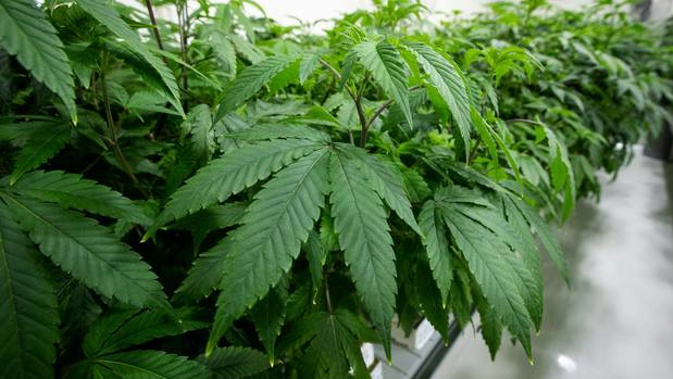
A legal cannabis market for recreational use could generate $675 million a year for the Government to spend on reducing cannabis-related harm, new economic modelling shows.
Two reports by Business and Economic Research Ltd (Berl) also say that legalisation would see an initial spike in cannabis use, accompanied by more cannabis-related hospitalisations.
But this would recede in the longer term and, with excise tax revenue put towards effective health interventions, cannabis users would have improved health outcomes while the justice system would save $11.4 million a year.
Berl's modelling was done for the Ministry of Justice in the lead-up to next month's referendum on legalising cannabis for personal use.
It was going to be published after the referendum in case it might unduly influence voters, but it has been released today following Official Information Act requests.
Justice Minister Andrew Little has so far been coy about the value of any levy on legal cannabis products, which would be ring-fenced for health services such as therapy or addiction treatment.
But Berl estimated the level of excise tax based on the current price of cannabis and three different levels of potency of THC - the psychoactive ingredient in cannabis.
It estimated the tax would net the Government $640 million per year.
Adding the revenue from licensing fees minus the cost of administering the scheme, Berl says there would be $675m a year that could be used for health services.
The Government would also net $181m in GST and $40m in income and company taxes.
Health interventions would see the number of cannabis users drop, as well as reduce the amount of cannabis used, assuming the interventions were effective.
"There is a lack of data or research to determine the extent of the success that may arise from any particular interventions," Berl says.
A recent report from an expert group, led by chief science adviser to the PM Juliet Gerrard, noted that many users didn't currently seek help given the stigma of using cannabis and the fear of prosecution.
Modelling of short-term and longer-term impacts of legalisation, including the effects of effective health interventions. Source / BERL
Successful interventions could see the number of cannabis users with long-term health conditions drop by between 4600 and 5900, and a reduction in the number of users with mental health diagnoses of between 6500 and 7800.
That would see fewer cannabis-related hospitalisations, fewer users leaving school without qualifications, and an increase in employability along with a $280 to $380 increase in annual incomes, Berl says.
The modelling assumed that a legal market would displace about two-thirds of the black market.
To meet that demand - 49.7 tonnes of cannabis a year - Berl says New Zealand would need 134 retail stores, 59 licenced cannabis cafes, and 227 combined stores; 207 retail stores would be based in six major cities, including 125 in Auckland.
The legal industry would employ 5000 people fulltime, creating $210m a year in salaries and wages and boosting GDP by $440m a year.
Berl's reports paint a sobering picture of current cannabis use in New Zealand, which currently exists in a black market given the illegal status of cannabis.
There are 74 tonnes of it consumed a year by 557,000 users aged 15 and over.
"An assumed price of $20 per gram suggests this market has a retail value of $1.5 billion," Berl says.
"Consumption is heavily dominated by daily users, with this group accounting for 62 tonnes of the total annual figure.
"The distribution of consumption is skewed towards those aged from 20 to 30 years old, especially for those of European ethnicity. There is also significantly large consumption by Māori 15 to 20 year olds."
Cannabis consumption by age group and ethnicity. Source / BERL
And it's mostly consumed in deprived communities, Berl says.
"Consumption by those in the most deprived quintile accounts for 40 per cent of the total."
Cannabis users, Berl says, are less educated, earn lower incomes, and have fewer job opportunities, longer-term health issues and worse mental health compared to non-users.
Currently there are about 1115 hospitalisations a year related to cannabis use, costing taxpayers $14.7 million, while police issued 3245 warnings issued in 2018, which saw 1650 charges and 1250 convictions.
"These incurred annual fiscal costs for justice and corrections of, respectively, $2.6 million and $11.3 million," Berl says.
Assuming the price in a legal market would mirror that in the $20-a-gram price in the black market, Berl estimated a short-term spike of a 30 per cent rise in cannabis consumed and 25 per cent more users if it was legalised.
That was based on what had happened in the states of Colorado, Massachusetts, Washington and the District of Columbia.
"Data from Colorado and Washington, indicate a substantial decline in use rates since legalisation, suggesting that this initial effect may tail off over a period of three to five years," Berl says.
The spike would be accompanied by 300 more hospitalisations a year, costing $4m more a year, but there would be 1930 fewer police warnings, 1200 fewer police charges, and 940 fewer convictions, saving almost $10 million in justice and corrections costs.
Justice outcomes would improve to $11.4m in savings a year over the medium-term, Berl says, assuming demand eventually reverted to what it currently is and the legal market replaces two-thirds of the black market.
Health outcomes only improved with the use of interventions.
Take your Radio, Podcasts and Music with you









